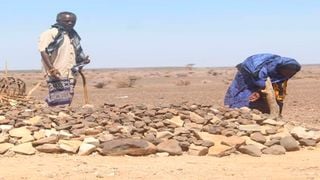
Relatives tend to the grave of Barako Elema Abudho who died of starvation at Galas in North Horr, Marsabit County.
| Nicholas Komu | Nation Media GroupNews
Premium
Mental health overlooked in drought-hit Marsabit
In the remote village of Watalii in Illeret, Marsabit County, Oiso Twala sits alone under the spotty shade of a withered tree muttering something to himself.
According to area Chief Boniface Yierar, Mr Twala lost his entire herd of livestock to the drought that has hit northern Kenya over the past two years.
The last five months have been especially bad for Mr Twala and his family, who have had to watch over 300 animals die, one after the other. One does not need a psychologist to explain that he is a stressed man.
“I have nothing left and nothing to feed my five children. Every night I go to bed I feel like crying thinking about how much I have lost,” he says as he walks into the empty enclosure that used to hold hundreds of animals.
In the Illeret area, local administrators put livestock deaths due to drought at over 250 per day.
Among the pastoral Daasanach community, one’s wealth and well-being are measured by the livestock they own. For them, losing your livestock means losing a part of your self-worth.
Aike Nyeruma, 70, is another local who can relate.
The father of 20 has not seen any of his children in weeks after they left home in search of food.
“Sometimes it feels better to just die rather than continue to suffer,” Mr Nyeruma says.
In the wake of the biting drought and famine in the northern region, the strain on the mental health of locals is beginning to set in.
“The loss is unbearable and people are beginning to suffer from depression. When people speak of the problems in such remote areas, mental health issues are easy to ignore but they are real,” Pastoralist Community Initiative and Development Assistance Director Wario Guyo explains.
With basic medical care already inadequate, access to mental healthcare is absent.
“Looking at the current situation, it is only a matter of time before we start receiving reports of suicides. There is only so much stress one can handle and these people are right on the edge,” Mr Wario says.
Similarly, residents of Kambinye sub-location in Laisamis sub-county have decried the rapidly accelerating mental health issues due to the impacts of the worsening drought.
Kambinye acting Assistant Chief Mustafa Tibiwa told the Nation that several pastoralist households in his jurisdiction were grappling with shock, depression and anxiety over the continued mass deaths of their animals in huge numbers.
“We have started witnessing escalating mental health issues among herders whose livestock have succumbed to lack of pasture and water,” Mr Tibiwa says.
More than 200 households, he said, faced acute water and food scarcity, driving them to the verge of despondency.
Elchute Gabana, a resident of Kambinye, said life was becoming unbearable as residents entirely depended on water trucking services.
They get 60,000 litres daily, carted by three water bowsers from Loglogo town, about 60km away, with each truck-full of water costing Sh15,000.
Halamayo Matacho, a mother of four, said that nursing mothers faced the brunt of the ravaging drought due to undernutrition and worries over what to feed their children as milk production from their animals had also drastically declined.
She said they skip several meals or do with only a meal per day as a way to cope amid the drought.
They also depend largely on rice and cabbages as their staple, without proteins as they no longer get milk and meat because most of the animals move far away in search of pasture.
Dawa Muslim Agency and Mountain of Mercy Representative Salim Vayai appealed to the government to not only provide relief food and water but mental healthcare as well.
“For the last two days we were here in Kambinye sub-location we have barely seen any drought interventions by the state despite the extreme despondency we have seen,” Mr Vayai says.
The World Health Organization (WHO) estimates an increase of 250,000 deaths per year between 2030 and 2050 due to the “well understood impacts of climate change.”
The impacts include heat-related morbidity and mortality, increases in vector-borne disease (dengue fever, malaria), increased respiratory illness due to extreme weather events.
The indirect health implications that are increasingly recognised in global reports on climate change include illness related to food and water safety, under-nutrition related to food insecurity, malignant melanoma from UV exposure, and chronic kidney from dehydration.
The reports indicate that there are also less known, and often overlooked, effects of climate change, including the risks and impacts on mental health.
According to the 2017 Lancet Report on Sustainable Development and Global and Mental Health, complexes can trigger post-traumatic stress disorder (PTSD), major depressive disorder (MDD), anxiety, depression, complicated grief, survivor guilt, vicarious trauma, recovery fatigue, substance abuse, and suicidal ideation.






